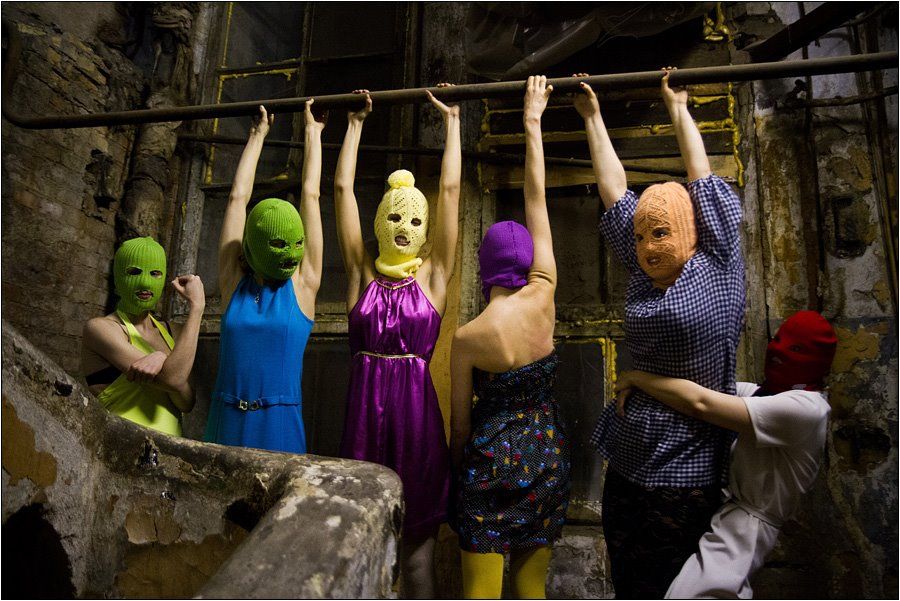The Foreign Affairs Symposium (FAS) announced today that Nadya Tolokonnikova, a member of the Russian punk protest band Pussy Riot, will be the first speaker of its spring series, "Undercurrent." Tolokonnikova, a radical feminist and anti-fascist activist, will speak in Shriver Hall at 7 p.m. on Feb. 1.
Pussy Riot garnered worldwide attention in February 2012 after entering Moscow’s Cathedral of Christ the Saviour and playing their protest song “Mother of God, Drive Putin Away” at the church’s altar. In the song, the group attacked Russian President Vladimir Putin’s re-election campaign, calling him a dictator, and criticized the leadership of the Russian Orthodox Church.
They were immediately arrested, and the Russian authorities charged Tolokonnikova and two other members of Pussy Riot with “premeditated hooliganism.” In the ensuing show trial and media frenzy, Tolokonnikova and her bandmates actively defended themselves and cross-examined witnesses. The court sentenced Tolokonnikova to two years in prison, which she served at a women’s penal colony called IK-14.
In September 2013, Tolokonnikova went on a hunger strike to protest poor conditions and human rights violations at the prison. She alleged that the guards at the prison had repeatedly threatened her. Women inmates were forced to work 16 or 17-hour days with only three or four hours of rest, and collective punishment and beatings were commonplace for even mild infractions of prison rules. She was later transferred to another penal camp in Siberia.
Activists in the West continuously called for her release, and many argued that Tolokonnikova became the most important political prisoner in Russia. But Russian critics of Pussy Riot and Putin supporters argued that their acts are divisive, crude and disrupt public order. Her correspondence from prison with Slovenian philosopher Slavoj Zizek was published in 2014 and quickly made its way around activist communities.

Tolokonnikova was released from a prison hospital on Dec. 23, 2013 after Putin issued a general amnesty before the 2014 Sochi Olympic Games. Some say the move was a deliberate decision to shore up Russia’s poor human rights record before the international extravaganza.
Instead of backing down, Tolokonnikova called on the international community to boycott the games. During the Olympics, Tolokonnikova and another Pussy Riot member, Maria Alyokhina, were falsely accused of theft and later assaulted and whipped by security forces in Sochi. Later, Tolokonnikova and Alyokhina, were assaulted by a group of men, who threw trash and green antiseptic on them, in a McDonald’s.
On Oct. 27, 2016, Pussy Riot released “Make America Great Again,” a song protesting U.S. President Donald Trump and his close relationship with Putin. In a recent New York Times interview, Tolokonnikova said that Americans cannot afford to trivialize what Trump has said about women, queer people, and other minority groups and that the “fake news” wave that has worried many Americans is ingrained in Putin’s Russia.
“It’s important to remember that, for example, in Russia, for the first year of when Vladimir Putin came to power, everyone was thinking that it will be O.K,” she told the Times.
Jonathan Brown, a co-executive director of FAS, wrote in an email to The News-Letter that Tolokonnikova has inspired Russians and the international community to hold Putin accountable for his "reactionary and regressive policies and general abuse of human rights."
Brown says that Tolokonnikova's work is especially critical because of the ever-strengthening right-wing populism that has gripped both Europe and the United States.
"Nadya will inspire the Hopkins and Baltimore community to resist such politics instead of simply being immersed in fear. She can teach our audience that their resistance is power," he wrote.





